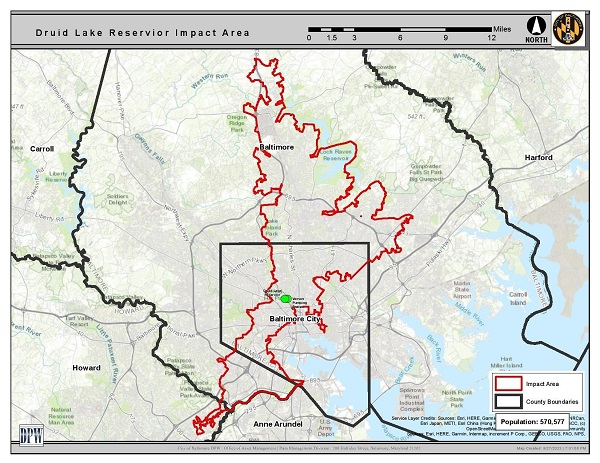UPDATE: The latest round of testing on October 3 showed no sign of the parasite mentioned below.
Original story below…
BALTIMORE, MD—On Thursday, the Baltimore Department of Public Works announced that, during a routine test of the Druid Lake Reservoir, low levels of the microscopic parasite Cryptosporidium were discovered.
Cryptosporidium is a microorganism commonly found in lakes and rivers, which can potentially cause gastrointestinal problems, particularly, in those who are immunocompromised, elderly, or children.
This detection impacts only a portion of the Baltimore region water system, in Baltimore City, Baltimore County, and Howard County. The affected area is shown in the map above.
DPW officials say drinking water remains safe for the general population. Residents can use DPW’s online interactive map to determine if they live in an impacted area.
Cryptosporidium is a microscopic parasite that can be found in water sources. While it can cause health issues, it’s important to emphasize that the levels detected in our water supply do not pose an immediate health risk to the general public. Cryptosporidium is extremely chlorine tolerant, like systems frequently used at hospitals, so secondary treatment is unlikely to reduce its levels.
The levels of Cryptosporidium detected in Baltimore’s water supply indicate a low risk for the general population. This means that for most people, the water is still safe to drink. However, vulnerable populations should consider taking precautions.
Health officials say most residents do not need to take any additional precautions unless they have an immunocompromising condition. Exposure to Cryptosporidium can cause cryptosporidiosis, symptoms can include diarrhea, vomiting, fever, and stomach pain. People with healthy immune systems typically are not impacted or quickly recover without medical treatment.
Examples of people with weakened immune systems include those with HIV/AIDS, those with inherited diseases that affect the immune system, cancer, and transplant patients who are taking certain immunosuppressive drugs.
Those with immunocompromising conditions and other sensitive populations are advised to:
- Drink bottled water
- Boil water for one minute before consuming
- Filter tap water using a filter labeled to ANSI/NSF 53 or 58 standards, or a filter designed to remove objects 1 micron or larger. These may be labeled “absolute 1 micron.” (i.e., not Brita-type filters)
The testing was conducted as part of DPW’s recently modified Administrative Order on Consent between the City of Baltimore and the U.S. Environmental Protection Agency which stipulates sampling for Cryptosporidium and Giardia at the City’s uncovered finished reservoirs. Work on the two remaining uncovered finished reservoirs, Ashburton and Druid Lake Reservoir, is expected to be completed by November 30, 2023 and December 30, 2023, respectively.
Samples were collected on September 19, 2023, at the Druid Lake uncovered reservoir and through testing 0.09 Cryptosporidium Oocyst/Liter was detected. The samples follow a thorough laboratory analysis and results are returned within seven days; the results for the test taken this month were returned on September 26, 2023. Monthly sampling collected at Druid Lake Reservoir in August showed no signs of Cryptosporidium.
DPW will conduct more frequent sampling for Cryptosporidium at finished water reservoirs until sampling results can reliably show that Cryptosporidium is not detected.
DPW will notify the public and media on the results of those additional sampling tests.
Additional information is available at the CDC website here.
Do you value local journalism? Support NottinghamMD.com today.

